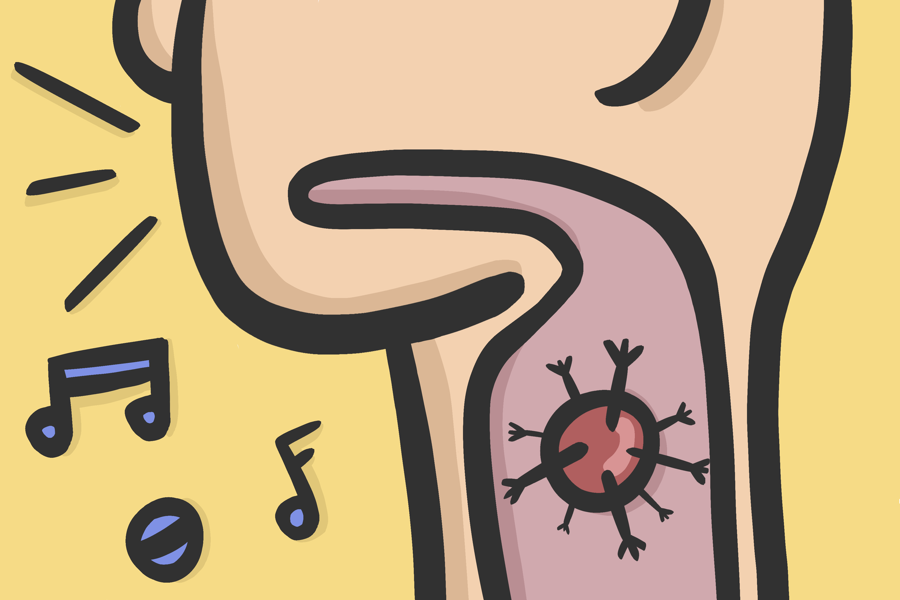NU singers reflect on performance abilities after contracting COVID-19
Illustration by Nathanial Ortiz
After contracting COVID-19, Northwestern singers reflect on the short-term effects they felt impacted their vocal capabilities. Early research suggests that contracting the virus may lead towards detrimental vocal effects including respiratory or pulmonary complications.
May 10, 2021
After contracting COVID-19, some Northwestern singers reflected on short-term effects that have impacted their vocal capabilities.
Early research suggests that contracting the virus may lead to detrimental vocal effects including respiratory or pulmonary complications –– compromising a singer’s ability to sing with support by engaging their diaphragmatic muscles.
This was Bienen freshman Sofia Ricciarini’s biggest concern at the time when she tested positive for COVID-19 in February.
Her asthma heightened her fears regarding potential respiratory problems, which might be further complicated by contracting COVID-19.
“My biggest issue is just that, trying to sing with a cough,” Ricciarini said. “It keeps my voice a little bit weaker than it usually is.”
Bienen Prof. Nancy Gustafson, Ricciarini’s vocal instructor, checked in on her regularly. Gustafson continues to ease Ricciarini back into her pre-COVID singing routine, not hesitant to halt rehearsal if she hears strain or vocal fry.
Ricciarini said she reaches shortness of breath at a much faster rate than before contracting the virus — a worrisome effect, as it may hinder her ability to effectively sing with support of the diaphragm.
Weinberg sophomore Arman Popli shared similar sentiments, as he also finds it difficult to sing with as much breath as he did before testing positive for COVID-19.
Popli does not have asthma or any other respiratory conditions. But he said he also felt as though contracting the virus heavily impacted his ability to breathe as effectively as he used to.
“My pitch, tone, high (and) low notes all feel the same,” Popli said. “It’s just been incredibly difficult to sing for a considerable amount of time and (do) so in a way that feels healthy.”
Weinberg freshman Sean Dukes said singing was one of the ways he was able to cope during his time in isolation at Foster-Walker Complex. Dukes performs with the Northwestern Community Ensemble and is part of Freshman Fifteen, an all-male a cappella group on campus.
While quarantining, Dukes sang for an audience of one, himself, to pass the time and practice his repertoire.
“I’ve been singing ever since I was seven, it’s something that brings me comfort,” Dukes said. “I was singing a lot because that’s all I can really do to alleviate boredom.”
Though he did feel the “occasional cough or scratch,” it was never enough to merit concern for his singing capabilities.
Now that he’s out of quarantine, Dukes said he feels “back to normal,” and he said he’s excited to return to rehearsal.
Dukes and Ricciarini emphasized that their ability to sing well is vital. Whether it be a means to cope, a hobby or an aspiring career path, good vocal performance is important to them and their time at NU.
“It is scary because people say there are a lot of long term lung consequences that we may just not know about,” Ricciarini said. “I’m willing to take it easy for now in the interest of preserving this instrument I value so much.”
Emails: [email protected]
Twitters: @D_Ramos42
Related Stories:
— The New Tradition Chorus serenades loved ones with Virtual Singing Valentines
— Choral society shows film on nonviolent Estonian “singing revolution” at EPL event
— Northwestern study: Singing on key can be learned through practice












